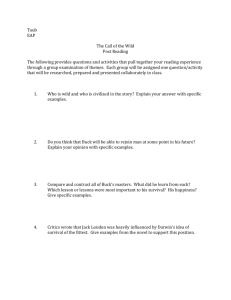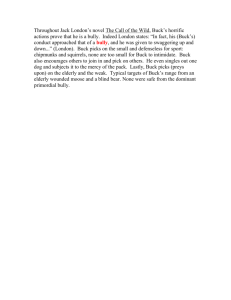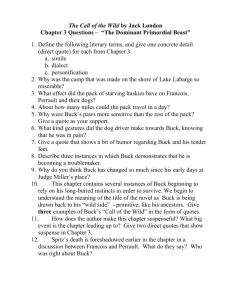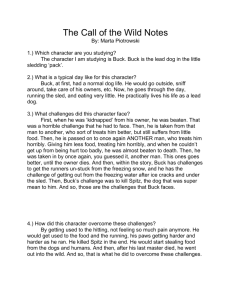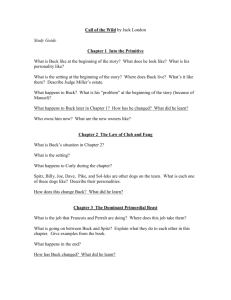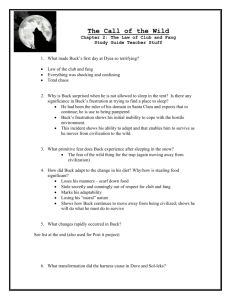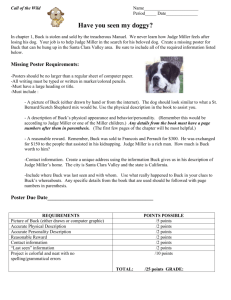The_Call_of_the_Wild_study_sheets (5)
advertisement
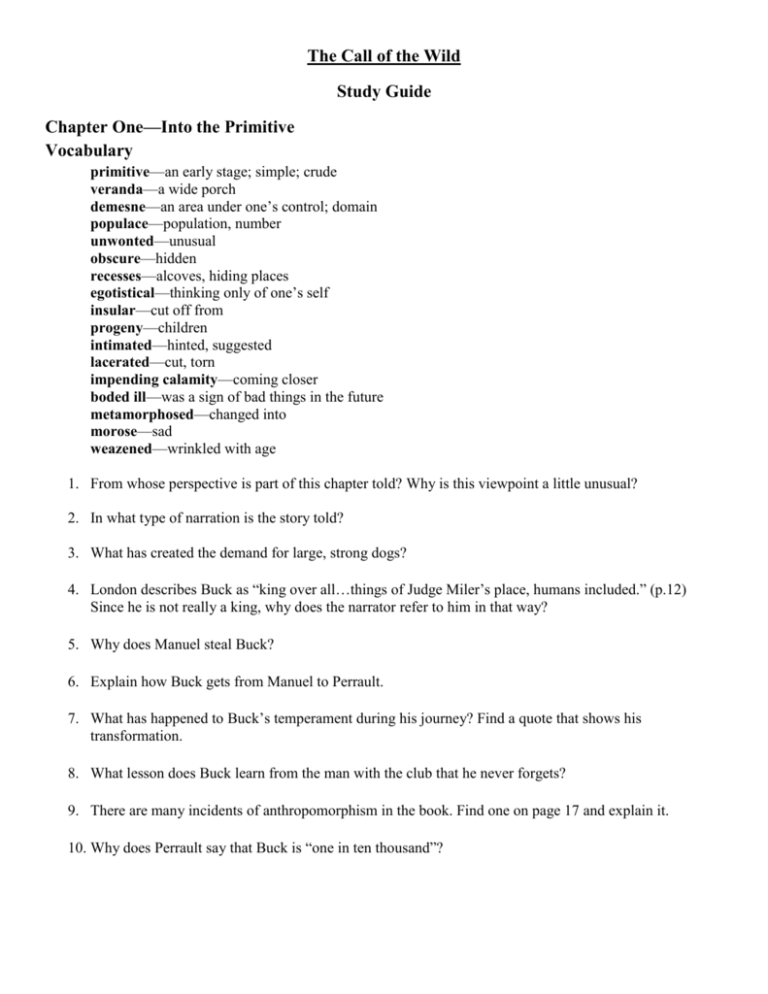
The Call of the Wild Study Guide Chapter One—Into the Primitive Vocabulary primitive—an early stage; simple; crude veranda—a wide porch demesne—an area under one’s control; domain populace—population, number unwonted—unusual obscure—hidden recesses—alcoves, hiding places egotistical—thinking only of one’s self insular—cut off from progeny—children intimated—hinted, suggested lacerated—cut, torn impending calamity—coming closer boded ill—was a sign of bad things in the future metamorphosed—changed into morose—sad weazened—wrinkled with age 1. From whose perspective is part of this chapter told? Why is this viewpoint a little unusual? 2. In what type of narration is the story told? 3. What has created the demand for large, strong dogs? 4. London describes Buck as “king over all…things of Judge Miler’s place, humans included.” (p.12) Since he is not really a king, why does the narrator refer to him in that way? 5. Why does Manuel steal Buck? 6. Explain how Buck gets from Manuel to Perrault. 7. What has happened to Buck’s temperament during his journey? Find a quote that shows his transformation. 8. What lesson does Buck learn from the man with the club that he never forgets? 9. There are many incidents of anthropomorphism in the book. Find one on page 17 and explain it. 10. Why does Perrault say that Buck is “one in ten thousand”? Chapter Two—The Law of Club and Fang Vocabulary primordial—primitive peril—danger imperative—important, necessary vicarious—secondhand, rather than direct experience draught—pulling reproof—blame ere—before introspective—inward-looking appeasing—soothing diabolical—devilish incarnation—exactness; absolute discomfiture—embarrassment belligerent—warlike, angry prowess—power indiscretion—an unwise act consternation—confusion; fear ignominious—marked by shame or disgrace disconsolate—very sad, gloomy ravenous—very hungry placating—calming, soothing fastidiousness—neatness; attention to detail heralded—announced primeval—primitive 1. Judging from the chapter title, what would you guess that this chapter is about? 2. What is the first thing Buck learns about dog fights? What is the second thing? 3. Why might you guess that Spitz is going to be Buck’s chief enemy? 4. Who do Perrault and Francois work for? Why is a good dog team so important to them? 5. From this point on, what is the setting for this story? 6. Why does sol-leks get upset when a dog approaches him on his blind side? 7. Find an example of foreshadowing in this chapter. What does the example to to the reader? 8. What lesson does Buck learn about surviving the cold winter nights? 9. Buck learns how to work in the harness from Dave and Sol-leks, and he learns much by observing others, but what does the narrator say he learned from instinct? 10. On page 21 the narrator says, “This first theft marked Buck as fit to survive in the hostile Northland environment.” What point is London making in the quotation? 11. What does London mean when he says, “His development (or retrogression) was rapid”? (pg. 22) 12. What is implied about Buck on the last paragraph of this story? Relate it to the title. Chapter Three—The Dominant Primordial Beast Vocabulary prone—having a tendency precipitate—foolish, unwise divined—guessed trice—instant din—noise daunted—stopped, discouraged preeminent—outstanding, excellent shirks—avoids work malingerer—something or someone who avoids work goaded—pushed grievously—seriously dubiously—doubtful prostrate—lying flat resolutely—determinedly skirted—avoided travail—difficulty covert—hidden, secret insidious—evil placatingly—calming wraith—ghost wan—pan, faint ecstasy—joy paradox—mystery exultantly—triumphantly inexorable—unable to be stopped resolutely—firmly 1. What is foreshadowed in the last sentence of the second paragraph 2. Why”? does the narrator say that a fight between Buck and Spriz is inevitable? 3. How does the narrator show that Buck is getting more like his wild, untamed ancestors? 4. On page 33 how does the narrator show that Buck is now truly a savage animal? 5. On pages 35-36, what vivid picture does the author depict? 6. Why does the narrator refer to Buck as the “dominant, primordial beast Chapter Four—Who Has Won to Mastership Vocabulary obdurate—stubborn, firm celerity—swiftness consultation—a meeting in which views are exchanged perplexed—confused, bewildered remnant—something left over lugubriously—sadly 1. Why does Buck refuse to be harnessed to the sled at first? 2. How is delivering dispatches different from simply delivering the mail? 3. What is another sign that Buck is becoming more of a wild animal and less of a domesticated dog? 4. On pages 42-43, what are the dreams Buck has of a man squatting by a fire in the darkness? 5. Dave is hurt internally. Why does he still insist on his place in the harness? 6. Inn the last paragraph what may we infer happens behind the river trees? Chapter Five—The Toil of Trace and Trail Vocabulary congested—crowded salient—standing out; attracting attention callowness—immaturity manifestly—completely slipshod—poorly maintained slovenly—sloppily inevitable—not capable of being avoided or prevented remonstrance—a strong objection abide—to remain, stay superfluous—unnecessary; beyond what is required averred—stated positively zeal—eagerness and enthusiasm formidable—inspiring fear, dread, or alarm cajole—coax amenities—courteous acts of polite behavior copious—full, plenty perambulating—walking about innocuously—harmlessly, innocently terse—short, brief Q.E.D.—(Latin)—therefore voracious—greedy importuned—pleaded, urged evinced--showed 1. Identify the literary term in the following quotation: “The congested mail was taking on Alpine proportions.” (pg. 48) 2. “Both men were manifestly out of place, and why such as they should adventure the North is part of the mystery of things that passes understanding.” (pg. 48) London sometimes tends to be wordy. How might the above sentence be put more simply? 3. 3. In your opinion, does Landon’s style of writing make the story more or less enjoyable for you? 4. What is the meaning of this sentence: “The two mongrels were without spirit at all; bones were the only things breakable about them”? (pg. 52) 5. During the trip, what human qualities does London attribute to Buck? What is this term called? Do you think Buck might know something like this? 6. How do the people change in the course of the trip? 7. How does the people’s own arrogance bring on disaster? 8. What had saved Buck? 9. Who saves Buck? How is it done? What do you expect will happen next? 10. Find the irony in the last thing John says. Chapter Six—For the Love of a Man Vocabulary waxed—grew feigned—false ministrations—aid, help transient—moving on entice—to attract by tempting convalescence—period of recovery from an illness expediency—selfishly, practically peremptorily—allowing no contradiction imperious—overbearing, domineering animated—lively plethoric—excessive amount provocation—act of provoking, arousing extremity—the end conjuration—the act of practicing magic 1. Why is Buck surprised that Thornton’s two other dogs, Nig and Skeet, are not jealous of the attention Thornton pays Buck? 2. In this chapter, what do “fire” and “fire and roof” symbolize or represent? 3. In what ways is Buck still a wild, cunning dog? 4. When the narrator says, “Kill or be killed, eat or be eaten, was the law and this mandate, down out of the depths of Time, he obeyed,” what law is London talking about? (pg. 64) 5. In contrast to “fire,” what does the author use to represent or symbolize the wild, primitive life? 6. Buck, on occasions, answers the call of the wild but always returns. Why? 7. On what three occasions does Buck show his fierce devotion to Thornton? 8. Explain how the following sentence is a metaphor: “…another exploit…that put his name many notches higher on the totem-pole of Alaskan fame.” (pg. 69) 9. Since you have seen so many amazing deeds performed by Buck, is pulling one thousand pounds surprising? Support your opinion. Chapter Seven—The Sounding of the Call Vocabulary salient—outstanding obliterated—completely removed commingled—mixed together overture—an offer or proposal pertinacity—stubbornness paroxysms—spasms or fits contagion—disease certitude—freedom from doubt calamity—disaster stealthily—secretly cessation—stopping, ending vigil—period of alert watchfulness 1. On page 76, Buck has the old dream again. What is he dreaming about? 2. Besides visions of the hairy, prehistoric man, what else is making Buck uneasy? 3. Answering the call of the wild one night, what does Buck come upon that runs off? 4. To satisfy his blood-lust, what larger animal does he stalk and finally kill? 5. After marching out of camp, how is Buck transformed? 6. What is the first indication to the reader that there might be trouble back at the camp? 7. When Buck finds Nig with an arrow protruding from his body, why are we not surprised that there are Indians in the area? 8. What is Buck now free to do after he discovers the destroyed camp? 9. In what ways have the wolves in the area changed and why? 10. What has become of Buck over the years?
